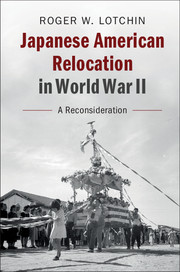‘Deeply engaging, original throughout, based on prodigious research in archival records and existing scholarship, Roger W. Lotchin's book is a path-breaking reexamination of the complex multiple causes and the actual human consequences of President Franklin D. Roosevelt's Executive Order 9066. His reconsideration of the role of racism in the World War II era is especially impressive, insightful, and timely.'
William Issel - San Francisco State University
‘A bold, nuanced, and engaging study of Japanese-American relocation and WWII. This well-researched and passionately argued book deserves to be read by every scholar studying the war and home front. A reconsideration will be debated for decades.'
Gary R. Mormino - University of South Florida, St Petersburg
‘Lotchin uses patience, solid evidence, and an open mind to challenge our racist interpretation of Japanese American ‘internment' centers during WWII. His fine book won't end the debate but should force us to confront our well-practiced and comfortable answers to who these people were and how many Americans really viewed them. The greatest testimony to the American identity of the men, women, and children who lived in these centers were the reproduction of the very communities from which they'd been taken and the unremarkable acceptance of these efforts by their captors. The lessons for us today couldn't be clearer or more poignant.'
Daniel J. Monti - Saint Louis University, Missouri
'This study examines the Japanese American internment experience during WWII from a tenuous historical position: that it was done because of war and nationalism, not racism. Lotchin defines the different groups in this interned community: Issei, who immigrated at the turn of the 20th century, were denied citizenship by law, and often favored Japanese culture; Nisei, the sons and daughters of the Issei, who were American citizens by birth; and Kibei, Nisei who spent time in Japan, learned proper Japanese, and often favored the Japanese cause. In 1942, fearing a fifth column that would welcome Japanese invaders, the army and California believed that removal was the only answer. … The author labels as ideologues modern historians who define internment only as an act of racism. This is an edgy study, and the author sits on a difficult side of history. Summing Up: Recommended.'
R. C. Doyle
Source: Choice





